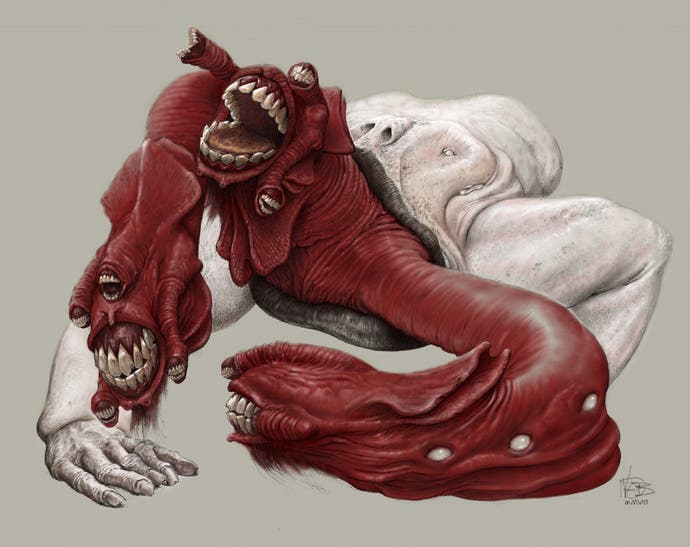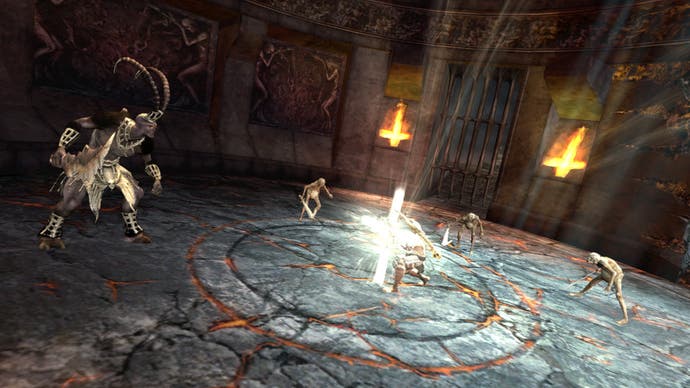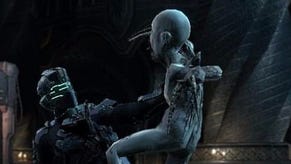Dante's Inferno
Go to Hell.
Back in the game, we encounter our first taste of an interesting mechanic tied intrinsically to the poem's themes of death, sin, punishment and damnation. Faced with a demonic soul begging for your mercy you are presented with a 'moral choice': Absolve or Punish. The concept of free will is central to Dante's belief system; in the game, he is deliberately presented as a more flawed figure than in the poem. Elect to Punish and Dante slays the demon by jamming his Holy Cross into its skull. We're not able to try out Absolve, but are told it triggers a mini-game which, if beaten, rewards you with double the energy. The moral: it's harder to absolve, but the rewards are greater.
It's highly reminiscent of the choice mechanic in BioShock, but with most of the game still under wraps, it's unclear what wider impact your choices may have. Knight will only hint at potential complexities, revealing that what begins as story of rescue becomes one of redemption. It's "less about saving Beatrice and more about saving Dante," he reveals.
Either way, it's fun violently shoving the cross into someone's face. If the early encounters are satisfying if standard fare for any God of War veteran, the first boss scrap offers a glimpse of the huge scale that promises to define Dante. Charon, the mythological ferryman of Hades, is represented as a giant galleon in the sky, its head at the bow, the deck its timber ribcage.

As the vessel soars through the sky, Dante must fend of a couple of enemy waves. With the deck clear, the camera pans to the starboard as a huge, hulking beast clambers over the side. At least 10 times the size of Dante, and under the control of a regular grunt, straddling its neck, it's a formidable opponent that requires strategic use of magic attacks and evasive manoeuvres (the right-stick rolls). Wear it down enough and you enter another God of War staple: a quick-time event sequence. Pull this off and you'll athletically bound up onto the beast's back, kill the rider and seize the reins for yourself. In control of this lumbering monster, you have access to its powers, including a double-fist slam and fire-breathing. It's an effective change of pace and dynamic.
Swatting away the remaining deck-based demons, you turn your attention to Charon. We won't spoil this bit for you, but suffice to say it's a deliciously satisfying end to a battle, after which Dante leaps with the beast from the crashing ship, clambering up a wall and racing to safety as massive stone platforms crumble and collapse beneath his feet. Replaying the level, we notice Charon in the distance, sailing serenely across the horizon, which is a lovely design touch, hinting at what is to come.
Beast-riding will play a major part in the experience, we're assured; and if the new trailer is anything to go by, expect memorable encounters on a Shadow of the Colossus scale.
The playable section ends abruptly with a swarm of a new enemy, blade-handed babies, with the piercing shrieks of newborns, that we instinctively wince at while chopping up. Yuk.
So, with over a year to go before release, this snapshot of Dante's Inferno is already slick, gorgeous, thrilling, atmospheric and highly enjoyable. There's clearly still work to be done: AI can be dopily standoffish in larger-scale rucks; melee attacks, particularly during the boss encounter, don't yet given an adequate sense of physical impact; QTEs need randomising; and textures are patchy in places. There's plenty of time to fix all of these issues, though; and in truth, it's not often we see such an assured presentation so far ahead of release.

But it's impossible to ignore the elephant - or rather, the Titan - in the room. EA is sticking so stubbornly to the God of War formula that it will absolutely be judged against one of the all-time great action series. EA knows this, of course, and is talking the talk. But with God of War III expected to release later this year, and including - lest we forget - its own take on beast-riding, EA will need to pull off a blinder at the first attempt to compete (at least on PlayStation 3, the exclusive home of Sony's title).
What we've seen so far has impressed, but it's what we've yet to see that will make the difference. The pedigree of the team is good enough; the scope and imagination of the poem even more so. And Dante is a far more subtle and compelling character than the one-dimensional angry-man routine of Kratos.
Medieval Christian mythology overthrowing the gods of antiquity? Now that would be poetic justice for Dante.
Dante's Inferno is due out on PC, Xbox 360 and PlayStation 3 in 2010.


